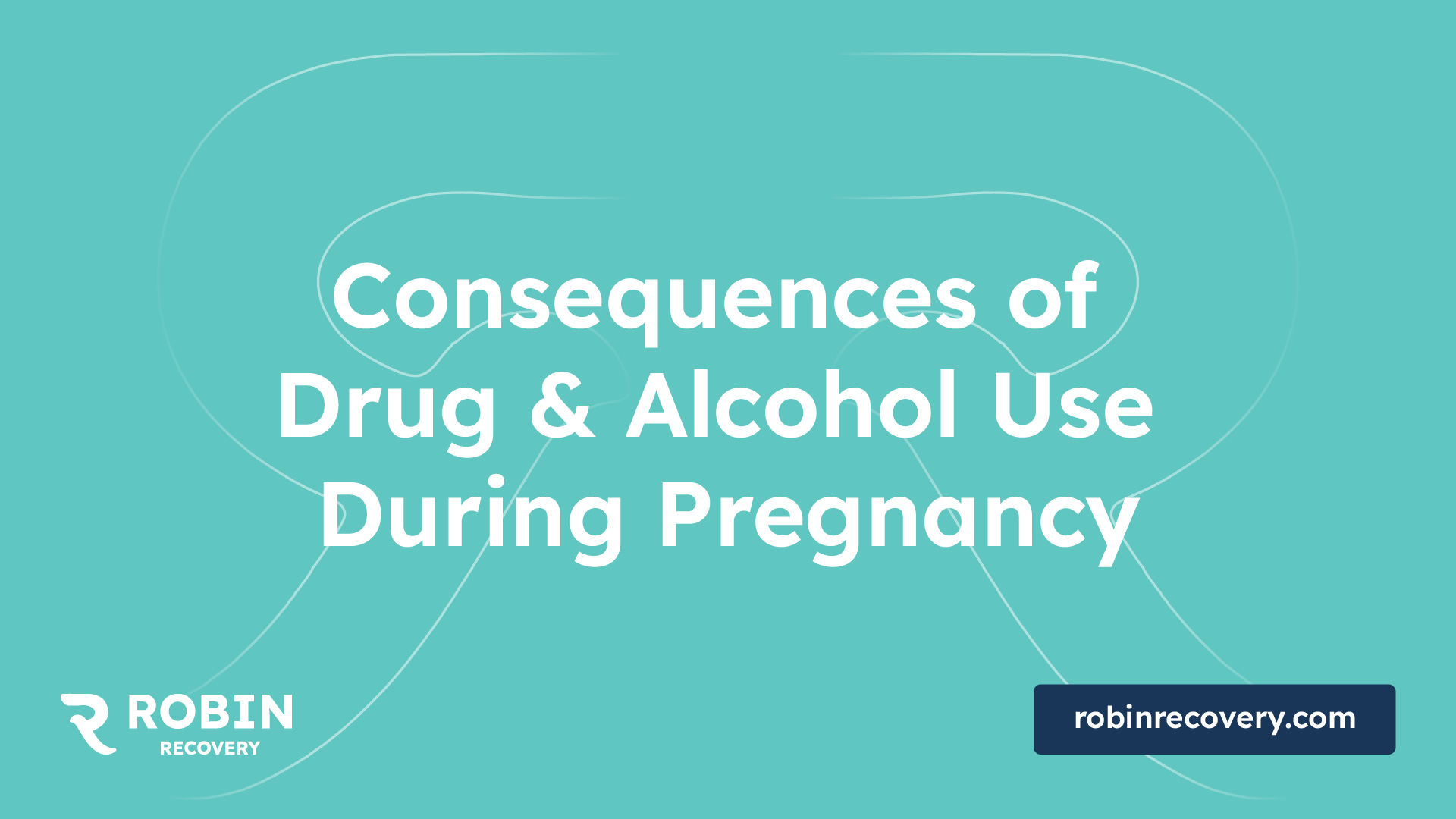Consequences of Drug & Alcohol Use During Pregnancy

Substance Use During Pregnancy
Substance use during pregnancy poses significant risks for both the mother and the developing fetus. Understanding the implications of drug and alcohol consumption is crucial for expecting mothers and healthcare providers.

Risks of Drug Use
The use of drugs during pregnancy, including tobacco and marijuana, as well as prescription pain relievers and illegal drugs, is linked to serious health concerns. Research indicates that these substances can increase the likelihood of complications such as premature birth, low birth weight, and developmental issues.
Substances can have varying effects on fetal development, leading to a range of negative outcomes. Studies show that approximately 5 percent of pregnant women engage in the use of one or more addictive substances. The increased risk associated with such use is concerning for public health.
Substance UsedAssociated RisksTobaccoLow birth weight, premature birthMarijuanaDevelopmental delays, behavior problemsPrescription Pain RelieversIncreased risk of neonatal withdrawalIllegal DrugsPremature birth, developmental issues
Impact on Stillbirth Risk
The consequences of substance use during pregnancy extend to increased stillbirth risk. Recent research indicates that smoking tobacco or marijuana, taking prescription pain relievers, or using illegal drugs is associated with double or even triple the risk of stillbirth [1]. This stark data emphasizes the urgent need for awareness and prevention.
SubstanceIncreased Stillbirth RiskTobacco2 to 3 times higher riskPrescription Pain RelieversSignificant increased riskIllegal Drugs2 to 3 times higher riskMarijuanaPotentially increased risk
These statistics represent just a portion of the risks associated with drug and alcohol use during pregnancy. Understanding these effects is essential for expecting mothers seeking to ensure their health and that of their unborn child.
Neonatal Withdrawal
Neonatal withdrawal occurs when an infant experiences withdrawal symptoms after birth due to the mother's substance use during pregnancy. This section focuses on two key areas: Neonatal Abstinence Syndrome (NAS) and the various withdrawal symptoms that may affect newborns.
Neonatal Abstinence Syndrome
Neonatal Abstinence Syndrome (NAS) is a condition that results when a baby is exposed to certain substances, particularly opioids, while in the womb. Regular use of some drugs during pregnancy can lead to this syndrome, where the baby undergoes withdrawal at birth [1]. While opioids have been the primary focus of research, other substances such as alcohol, barbiturates, benzodiazepines, and caffeine can also contribute to withdrawal symptoms in infants.
The severity of NAS can range widely, affecting how the baby is treated after birth. Healthcare providers may need to monitor these newborns closely and provide supportive care to help manage symptoms.
Withdrawal Symptoms
Withdrawal symptoms in newborns can vary based on the substance used and the duration of exposure. Common symptoms of NAS include irritability, poor feeding, temperature instability, and difficulty sleeping. The list below outlines several withdrawal symptoms that may be observed in affected infants:
SymptomDescriptionIrritabilityExcessive fussiness or inability to be soothedPoor FeedingDifficulty latching or feeding; reduced appetiteTemperature InstabilityFluctuations in body temperatureDifficulty SleepingFrequent waking and trouble calming downHyperactive ReflexesOveractive muscle responsesSeizuresAbnormal electrical activity in the brain that leads to convulsionsVomitingFrequent spitting up or inability to retain food
The effects of drug and alcohol use during pregnancy can lead to long-term challenges for both the infant and the family. Results from substance use can significantly impact infant health and development. Some of these issues may require ongoing medical attention and supportive interventions post-birth, emphasizing the importance of awareness and prevention strategies among expectant mothers. For further understanding of substance use and its consequences, visit our articles on how pets can help with the recovery process and breaking the cycle of addiction in families.
Specific Substance Effects
Understanding the specific effects of various substances during pregnancy is critical. This section covers the impacts of alcohol and tobacco, as well as cannabis and methamphetamine.
Alcohol and Tobacco
Alcohol consumption during pregnancy poses serious risks, including fetal alcohol spectrum disorders (FASDs), which are a group of conditions resulting from alcohol exposure in utero. There is no known safe amount of alcohol one can consume during pregnancy, and all forms of alcohol, including wine and beer, are equally harmful [2].
Tobacco use, when combined with alcohol use beyond the first trimester, significantly increases the risk of sudden infant death syndrome (SIDS). Children born to mothers who both drank and smoked have a twelvefold increased risk for SIDS compared to those who were unexposed or only exposed to these substances in the first trimester [1].
SubstanceRisksAlcoholFetal alcohol spectrum disorders (FASDs), no safe amount during pregnancyTobaccoIncreased risk of SIDS, lower birth weight and complications
Cannabis and Methamphetamine
Cannabis use among pregnant women has seen a notable rise. From 2010 to 2017, past-month use doubled from 3.4% to 7.0% among pregnant women overall, with first-trimester use surging from 5.7% to 12.1% [1]. The effects of cannabis on fetal development are still being studied, but potential risks include low birth weight and developmental challenges.
Methamphetamine use during pregnancy is associated with severe adverse outcomes, including low birth weight, early labor, and increased risk of placental abruption. Babies exposed to methamphetamine may experience withdrawal symptoms after birth, impacting their overall health and development.
SubstanceRisksCannabisPotential low birth weight, developmental challengesMethamphetamineLow birth weight, early labor, increased risk of placental abruption
Both alcohol and tobacco, as well as cannabis and methamphetamine, impose significant risks during pregnancy. Understanding these risks is crucial for making informed choices to protect both maternal and infant health. For more information on withdrawal symptoms related to substance use, visit our section on neonatal abstinence syndrome.
Maternal Health Risks
Cocaine Use
Cocaine use during pregnancy poses serious risks to both the mother and her baby. Pregnant women who consume cocaine are more susceptible to maternal migraines, seizures, premature rupture of membranes, and placental abruption. The effects extend to the newborn, as babies born to mothers using cocaine may encounter various health issues, such as low birth weight, reduced head circumferences, irritability, hyperactivity, and tremors right after birth. Newborns may also present with high-pitched crying and excessive sucking [1].
To help illustrate these risks, consider this table of potential complications associated with cocaine use during pregnancy:
Health ConcernsImpact on MotherImpact on BabyMaternal MigrainesIncreased occurrenceN/ASeizuresHigher riskN/APremature RuptureYesN/APlacental AbruptionYesPotentially life-threateningLow Birth WeightN/AYesNeurodevelopment IssuesN/AYes
Opioid Use Disorder
Opioid use disorder during pregnancy has surfaced as a critical public health concern. Between 2010 and 2017, the number of women with opioid-related diagnoses at delivery hospitalization surged by 131%. This condition has been associated with severe health implications, including preterm birth, stillbirth, maternal mortality, and Neonatal Abstinence Syndrome (NAS) [2].
Newborns affected by opioid use during pregnancy often experience Neonatal Opioid Withdrawal Syndrome (NOWS), leading to various symptoms such as irritability, poor feeding, temperature instability, and sleeping difficulties. Treatment options such as methadone and buprenorphine during pregnancy have shown efficacy in reducing the severity of NOWS [3].
Here is a table summarizing the implications of opioid use disorder in pregnant women:
Health ConcernsImpact on MotherImpact on BabyPreterm BirthYesYesStillbirthYesYesMaternal MortalityYesN/ANeonatal Abstinence SyndromeN/AYesIrritability in NewbornsN/AYesDifficulty FeedingN/AYes
Understanding the potential health risks associated with substance use during pregnancy is crucial for both mothers and healthcare providers. For more information on the overall impact of substance use during pregnancy, explore our section on the effects of drug & alcohol use during pregnancy.
Medication Impacts
Teratogenic Effects
The use of certain medications during pregnancy can significantly impact fetal development. Medications that are teratogenic, meaning they can cause birth abnormalities, can interfere with the normal growth and development of the fetus. Common categories of teratogenic drugs include anticonvulsants, retinoids, and immunosuppressants. These substances can lead to various complications such as congenital disabilities and developmental issues.
The risk of a birth abnormality for any baby is approximately 4% regardless of the pregnancy circumstances. However, the presence of specific teratogenic medications can substantially increase this risk [4]. Alcohol use during pregnancy poses similar risks, including fetal alcohol spectrum disorders, which can result in conditions such as low IQ and facial abnormalities, as well as central nervous system dysfunction [5].
Drug TypePotential EffectsAnticonvulsantsBirth defects, developmental delaysRetinoidsFacial abnormalities, congenital heart defectsImmunosuppressantsIncreased risk of infections, developmental issues
Neonatal Opioid Withdrawal Syndrome
Neonatal Opioid Withdrawal Syndrome (NOWS) occurs when a baby is exposed to opioids in utero and subsequently experiences withdrawal symptoms after birth. This syndrome can arise from maternal use of opioid medications for pain management or from illicit drug use during pregnancy. Symptoms of NOWS may include irritability, feeding difficulties, vomiting, and seizures.
This condition requires careful medical attention, as affected infants may need supportive care and, in some cases, medication to manage withdrawal symptoms. The effects of opioid exposure during pregnancy highlight the importance of understanding the implications of medication use and the potential for addiction in both mothers and their children.
Key symptoms of NOWS:
SymptomsDescriptionIrritabilityExcessive crying, trouble calmingFeeding difficultiesPoor feeding, weight lossNeurological problemsTremors, seizures
Recognizing the impact of medication and substance use during pregnancy is crucial for preventing adverse outcomes. For further information about substance use during pregnancy, check out our article on breaking the cycle of addiction in families.
Public Health Concerns
Illicit Drug Use Among Pregnant Women
Illicit drug use among pregnant women presents a significant public health challenge. According to the National Survey on Drug Use and Health, the prevalence of current illegal drug use among pregnant women was 5.1% from 2007-2008 to 2009-2010. This rate remains notably lower than that of nonpregnant women, which was reported at 10.9%.
Among those using drugs, findings indicate variability in substance use rates based on age. For instance, a survey highlighted that the highest rate of current drug use among pregnant women occurred in the youngest age group, specifically 16.2% for women aged 15 to 17. This group also exhibited a higher prevalence of cigarette smoking at 22.7% compared to nonpregnant women the same age.
Age GroupCurrent Drug Use %Cigarette Smoking %15-17 years16.222.718-25 yearsData not specifiedData not specified
Given these statistics, it's essential to raise awareness and provide support systems aimed at addressing illicit drug use during pregnancy.
Substance Use Rates by Age Group
Understanding substance use rates based on age helps identify high-risk populations and tailor public health interventions effectively. The following table summarizes the reported substance use rates among pregnant women by age group:
Age GroupCurrent Drug Use Rate (%)15-17 years16.218-25 yearsIncreasing trend of opiate use26-34 yearsData not reported35 and olderData not reported
The data indicates a rising concern regarding opiate use among women aged 18 to 25, suggesting a need for focused strategies to combat this trend. Moreover, over 40% of women who reported using methamphetamine during pregnancy continued usage into the third trimester, underscoring the urgency of addressing the repercussions of meth use during gestation.
Efforts to mitigate these public health risks must include education on the effects of drug & alcohol use during pregnancy and access to effective resources for pregnant women facing substance use challenges.
References
[2]:
[3]:
[4]:
[5]:
